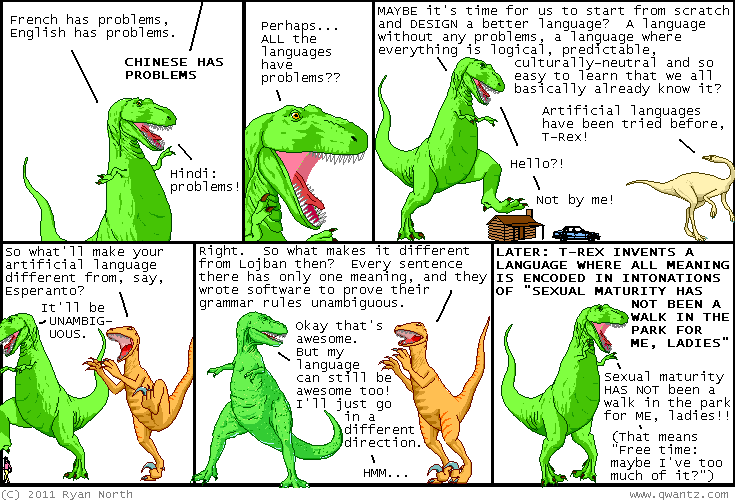T-Rex has a new idea
« previous post | next post »
The latest Dinosaur Comics:
(As usual, click on the image for a larger version.)
Mouseover title: "regrets are for people who didn't take days off… to invent languages nobody will ever use?"
Ryan North's innovation here is the idea of encoding arbitrary messages in the "intonation" — presumably pitch, timing, and voice quality — of an invariant English sentence. This goes beyond the whistle languages, drum languages, or even the range of Pirahã "channels" described by Dan Everett.
Something for the next edition of Arika Okrent's book…

John Cowan said,
April 8, 2011 @ 9:40 am
A notion strangely parallel to that of providing well-nigh arbitrary messages in a comic whose graphics are invariant.
Q. Pheevr said,
April 8, 2011 @ 9:51 am
Sexual ‘maturity' has (not) been a walk in the park for me… ladies?
Jonathan Badger said,
April 8, 2011 @ 11:28 am
Admit it John, you are just happy that Lojban got a mention in a second geeky webcomic, ;-)
Arika Okrent said,
April 8, 2011 @ 11:28 am
I would be surprised if no one's ever attempted an intonation language before. There have been several musical conlangs (musilangs?) — I recall one that had the idea that you could then speak two languages, with two different messages, at once (!)
Sexual? Maturity has not been a walk-in. — The park for mi-ladies!
Jenno said,
April 8, 2011 @ 12:25 pm
@Q. Pheevr – Sexual maturity HAS not been a? walk in the park for ME. Ladies.
Azimuth said,
April 8, 2011 @ 2:15 pm
Songmaster, by Orson Scott Card.
KMB said,
April 8, 2011 @ 3:58 pm
Sȅxu᷅āl mâtûrìtỳ hās nòt béén a᷈ wālk i̋n thè pǎrk fo᷄r me᷄ lādíés.
(Trans: Today's comic continues the development of T-Rex's language.)
Arjun said,
April 8, 2011 @ 5:27 pm
Don't forget Pynchon's "You never did the Kenosha, kid."
Previously covered on Language Log: http://itre.cis.upenn.edu/~myl/languagelog/archives/001288.html
Nathan Myers said,
April 8, 2011 @ 11:38 pm
Compare the case of the soap-opera actress in John Sayles's "Passion Fish" trying to decide how to say her upcoming line, "I didn't ask for an anal probe".
"I didn't ask for an anal probe." (Did anybody?)
"I didn't ask for an anal probe." (Despite what they insist, and I'm not paying.)
"I didn't ask for an anal probe." (And I could have done without, thank you very much.)
"I didn't ask for an anal probe." (I asked about them. Why all the time, anyway?)
"I didn't ask for an anal probe." (I paid for ten sessions!)
"I didn't ask for an anal probe." (Can't they think of anyplace else?)
"I didn't ask for an anal probe." (They could try a little variety once in a while.)
Ken Brown said,
April 9, 2011 @ 1:49 pm
"what is this thing called love"
Potentially punctuated in about ten or twelve various ways.
maidhc said,
April 10, 2011 @ 2:09 am
My wife and I are trying this with variations of the intonation of "hmm", like
H: Hmm? (Do you want any more stew?)
M: Hmm. (Is there any dessert?)
H: Hmm! (Make up your mind!)
M: Hmm. (Well, all right, but just half a bowl.)
We figured it might come in handy later on if one of us loses the capacity for speech. But the concept needs further development before it becomes a fully featured means of communication.
maidhc said,
April 10, 2011 @ 4:38 am
After one of my comments in another thread, I thought of another example–Dudespeak.
I remember some years ago hearing a program on NPR about how this rather militaristic father suspected his son was taking drugs so he bugged his phone and recorded all his conversations.
It turned out a lot of them consisted only of the word "Dude" in different intonations.
"Dude?"
"Dude!"
"Dude…"
"Dude."
[(myl) Apparently they were acting out some of the various cartoons on the subject.]
Ray Girvan said,
April 10, 2011 @ 8:39 pm
Malkovich, Malkovich …
Meagen said,
April 11, 2011 @ 6:21 am
Me: …tea. (I rather feel like having a cup of tea.)
Husband: Tea! (I quite enjoy tea myself.)
Me: Tea? (Shall I make some for both of us, then?)
Husband: Tea. (Yes please.)
Me: Tea! (I'm off to put the kettle on, then.)
Dan Blum said,
April 11, 2011 @ 10:21 am
Robert Sheckley's 1965 story "Shall We Have a Little Talk?" features a world where the language changes much, much faster than anywhere else. At the end of the story, it consists entirely of the word "mun." The Tensor discusses it from a linguistic viewpoint here:
http://tenser.typepad.com/tenser_said_the_tensor/2006/09/shall_we_have_a.html
Avery said,
April 12, 2011 @ 10:39 pm
"The Joys of Yiddish" (1968) has an essay in its concluding section on precisely the theme Nathan Myers covered. I guess it's common in Jewish English.
Gareth Rees said,
April 18, 2011 @ 1:20 pm
In Caryl Churchill's 1997 play Blue Kettle, the lexical inventory of the characters gets cut down until only the two words in the title remain (and then towards the end even those are lost). The idea, or one of the ideas, is to dramatise the extent to which communication is phatic, predictable, and non-lexical.